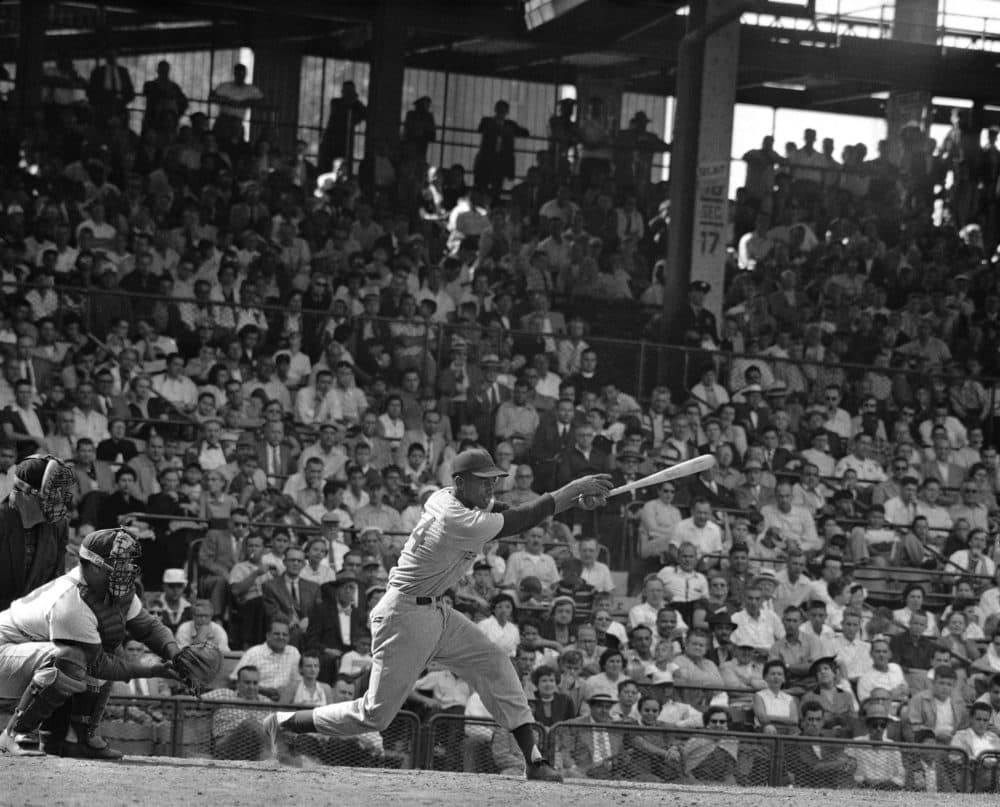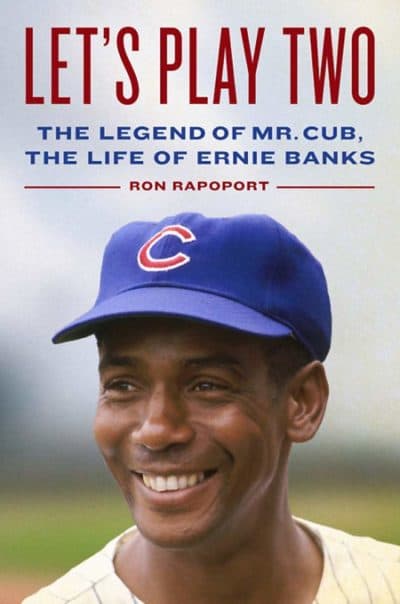Advertisement
Double Play: A Former State Senator's Car Ride With Ernie Banks
Resume
On the morning of Sept. 11, 2001, former Illinois State Senator William Marovitz was in Omaha, Nebraska for a private golf event. Marovitz couldn't fly home due to air traffic restrictions. So days after the attacks, he decided to rent a car and drive the seven hours home to Chicago. His golf partner, Baseball Hall of Famer and Cubs legend, Ernie Banks, said, "I'm coming with you."
"Upon meeting people, Banks would always ask a question and then follow up with more," Ron Rapoport writes in his book "Let's Play Two: The Legend of Mr. Cub, the Life of Ernie Banks." "Only later would those talking to him realize that he had not said a single word about himself."
But traveling across the Midwest in the passenger seat of William Marovitz's rental car, Banks opened up.
Listen to our "Double Play" of the prologue to Ron Rapoport's book, "Let's Play Two: The Legend of Mr. Cub, the Life of Ernie Banks" by clicking the play button next to the headline at the top of the page. Thanks to our actors: Amory Sivertson, Candice Springer, Alex Ashlock, Gary Waleik, Alex Schneps and Kelvin Brooks.
Looking for more from our "Double Play" radio theater series? Find more stories here.
Omaha
 From Let's Play Two: The Legend of Mr. Cub, the Life of Ernie Banks
From Let's Play Two: The Legend of Mr. Cub, the Life of Ernie BanksBy Ron Rapoport
On the morning of September 11, 2001, former Illinois State Senator William Marovitz was awakened in a hotel room in Omaha, Nebraska, by the sound of a ringing telephone.
"Turn on the TV," the voice in his ear said.
"It’s early," Marovitz said.
"Turn it on."
Together, they watched smoke billowing from the North Tower of the World Trade Center in New York and the chaos in the streets below. Then they gasped in unison as a second plane struck the South Tower.
Marovitz hurriedly dressed and took a cab to the golf course not far away. There he joined more than one hundred others who had been invited to attend an outing arranged by Warren Buffett, the businessman, investor, and philanthropist and one of the world’s richest men.
"For the first time in my life, I’m speechless," Buffett said. But those who had flown to Omaha should entertain no thoughts of returning home any time soon, Buffett warned. "I know many of you have your own planes. But it doesn’t matter. The sky is closed."
Marovitz looked around for the two men he had previously arranged to play with: Stedman Graham, a Chicago businessman who was best known as the fiancé of Oprah Winfrey, and Ernie Banks, the Hall of Fame baseball player who had spent his entire career with the Chicago Cubs. As they made their way around the course, they could see Buffett visiting with each group of golfers and giving them updates on the attacks. As he approached them, Buffett’s walkie-talkie crackled. "Mr. Buffett, Air Force One has just landed in Omaha."
The plane carrying George W. Bush had arrived at nearby Offutt Air Force Base, the headquarters of the United States Strategic Command, which contained an underground bunker built to withstand a nuclear blast. "At that point, we don’t know if we’re in the safest place in the world or the most dangerous," Marovitz says.
At breakfast the next morning, Graham told Marovitz and Banks that Winfrey would be sending a plane, but as the day wore on it became clear that not even Oprah Winfrey would be able to breach the closure of the nation’s air traffic, and for two more days Buffett’s out-of-town visitors remained stranded.
On the third day, Marovitz began making calls and found a rental agency that had a car available. He invited his golfing companions to join him, but Graham held firm. He would wait for Winfrey’s plane, he said. But Banks said, "I’m coming with you," and, after getting directions from the hotel, the two men set off on a trip to Chicago they were told would take about seven hours.
Despite Banks’s constant public display of good cheer, Marovitz and others who knew him well were aware of another, more complicated side of his personality. Upon meeting people, Banks would always ask a question and then follow up with more. Only later would those talking to him realize that he had not said a single word about himself. "He'd ask me, 'How’s that new restaurant doing?,' 'Are you going to run for office?,' 'Have you seen the mayor lately?,' " Marovitz says. Over the years, the people closest to Banks had learned that these questions — and especially his two best-known greetings: "Are you married? and "How’s your wife?" — were a defense mechanism. As long as he was asking questions, he didn’t have to answer them.
He was widely hailed as baseball’s greatest ambassador. He exuded happiness and insisted there was nothing he would rather do than play baseball. He never refused to give an interview or sign an autograph. And his signature line — "It’s a beautiful day for a ball game; let’s play two" -- became a much-quoted, and much-parodied, part of the American vocabulary. But he would not talk about himself.
But as the two men rode through the flat Midwestern landscape, Banks began to talk. And for the first time since Marovitz had known him, and the last, he talked about himself.
---
He talked about growing up as the oldest boy in a family of twelve in Dallas and the responsibilities that entailed. Once, he had missed a year of school to help his father pick cotton. He talked about playing for the Kansas City Monarchs as the Negro Leagues were in their final years because the best young black players were following Jackie Robinson and the other pioneers into the major leagues. He talked about Buck O’Neil, Cool Papa Bell, and all the others who had missed their chance because they had been born too soon and how they compensated by teaching those who came after everything they knew.
He talked about the women in his life and the mistakes he had made with them, one after another. He talked about his distant relationship with his three children and how he wished he had been a better father. He talked about his teammates who had become as close as family during their playing days. He talked about Leo Durocher, who had humiliated and mocked him while Durocher was managing the Cubs, and how he had responded with silence and runs batted in.
He talked about the piercing disappointment of the Cubs’ fabled, fated season of 1969, when the city and its fans had been on fire until the all too bitter end. He talked about the pain of never having played in a World Series and the fear that he would be remembered more for that piece of bad luck than for the great player he had been. He talked about the pleasures and burdens of being the very symbol of his team, a one and only, Mr. Cub.
---
The hours rolled by, and Marovitz, fascinated by Banks’s stories about himself – fascinated that Banks was telling stories about himself – glanced up and saw a sign that said Claire City. This doesn’t seem right, he thought. He had been distracted by Banks’s monologue, he realized, and not paying attention to where they were going. He had better stop and check the directions he’d been given back at the hotel.
"Chicago?," the man at the gas station said, and burst out laughing. "You came the wrong way, fella."
Marovitz had not driven east from Omaha toward Illinois, he was told, but north into South Dakota. He had driven through South Dakota, in fact, almost to the North Dakota border. The seven-hour trip he had planned would now take at least fourteen. Laughing at the absurdity of it all, he gave his passenger the bad news, turned the car around, and headed for home, Ernie Banks talking about himself all the while.
Excerpted from the book LET’S PLAY TWO by Ron Rapoport. Copyright © 2019 by Ron Rapoport. Reprinted with permission of Hachette Books. New York, NY. All Rights Reserved.
This segment aired on April 13, 2019.
